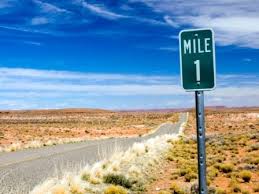记忆方法
将“mile”与“me”结合起来记忆,想象你“me”在走的距离,即“me”的距离,简记为“mile”。这种关联可以帮助你记住单词的含义是“英里”。
以上内容由AI生成, 仅供参考和借鉴
中文词源
mile 英里
来自拉丁语milia,一千,词源同million,millimeter.后引申词义英里,即一千整步,两千小步。
英语词源
- mile
-
mile: [OE] Latin mille denoted ‘thousand’ (it is the source of English millennium [17], etymologically a ‘thousand years’, and, via Italian and French, of million [14]). Its plural mīllia was used in ancient Rome for a measure of length equal to a thousand paces. This was borrowed into prehistoric West Germanic as *mīlja, which has subsequently differentiated into German meile, Dutch mijl, and English mile. (The English mile is over 100 yards longer than the Roman one was.)
=> millennium, million - mile (n.)
- Old English mil, from West Germanic *milja (cognates: Middle Dutch mile, Dutch mijl, Old High German mila, German meile), from Latin milia "thousands," plural of mille "a thousand" (neuter plural was mistaken in Germanic as a fem. singular), of unknown origin.
The Latin word also is the source of French mille, Italian miglio, Spanish milla. The Scandinavian words (Old Norse mila, etc.) are from English. An ancient Roman mile was 1,000 double paces (one step with each foot), for about 4,860 feet, but there were many local variants and a modern statute mile is about 400 feet longer. In Germany, Holland, and Scandinavia in the Middle Ages, the Latin word was applied arbitrarily to the ancient Germanic rasta, a measure of from 3.25 to 6 English miles. Mile-a-minute (adj.) "very fast" is attested from 1957.
权威例句
- 1. The President is determined "to go the extra mile for peace".
- 总统决心“为实现和平而加倍努力”。
- 2. "How do you know he's Irish?" —"Sticks out a mile."
- “你是怎么知道他是爱尔兰人的呢?”——“明摆的事嘛。”
- 3. He closed his door and started the quarter-mile walk down the hill.
- 他关上门,踏上了1/4英里长的下山路.
- 4. A 25 mile traffic jam clogged the northbound carriageway of the M6.
- 长达25英里的交通拥堵阻塞了M6号高速公路的北行车道。
- 5. We stood out a mile on that first day at school.
- 上学第一天,我们就非常惹人注意。

